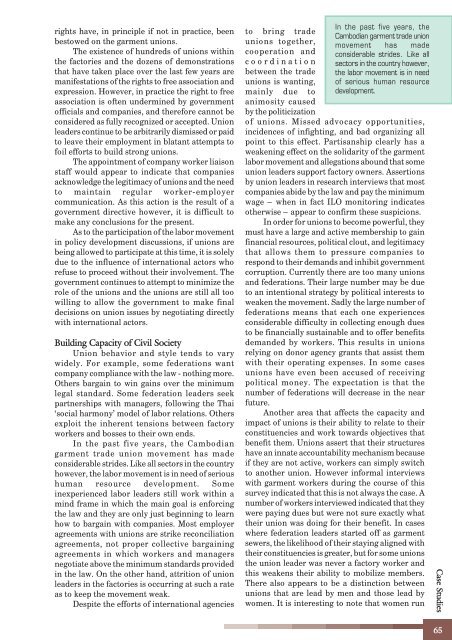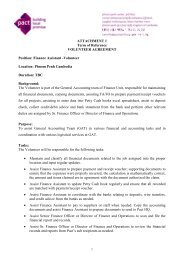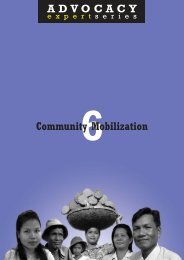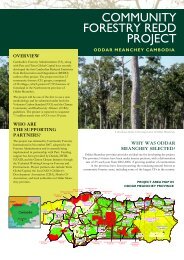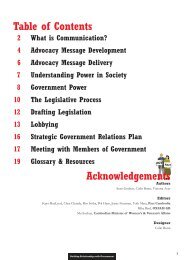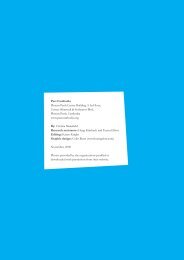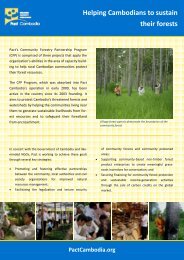Advocacy in Cambodia: Increasing Democratic ... - Pact Cambodia
Advocacy in Cambodia: Increasing Democratic ... - Pact Cambodia
Advocacy in Cambodia: Increasing Democratic ... - Pact Cambodia
Create successful ePaper yourself
Turn your PDF publications into a flip-book with our unique Google optimized e-Paper software.
ights have, <strong>in</strong> pr<strong>in</strong>ciple if not <strong>in</strong> practice, been<br />
bestowed on the garment unions.<br />
The existence of hundreds of unions with<strong>in</strong><br />
the factories and the dozens of demonstrations<br />
that have taken place over the last few years are<br />
manifestations of the rights to free association and<br />
expression. However, <strong>in</strong> practice the right to free<br />
association is often underm<strong>in</strong>ed by government<br />
officials and companies, and therefore cannot be<br />
considered as fully recognized or accepted. Union<br />
leaders cont<strong>in</strong>ue to be arbitrarily dismissed or paid<br />
to leave their employment <strong>in</strong> blatant attempts to<br />
foil efforts to build strong unions.<br />
The appo<strong>in</strong>tment of company worker liaison<br />
staff would appear to <strong>in</strong>dicate that companies<br />
acknowledge the legitimacy of unions and the need<br />
to ma<strong>in</strong>ta<strong>in</strong> regular worker-employer<br />
communication. As this action is the result of a<br />
government directive however, it is difficult to<br />
make any conclusions for the present.<br />
As to the participation of the labor movement<br />
<strong>in</strong> policy development discussions, if unions are<br />
be<strong>in</strong>g allowed to participate at this time, it is solely<br />
due to the <strong>in</strong>fluence of <strong>in</strong>ternational actors who<br />
refuse to proceed without their <strong>in</strong>volvement. The<br />
government cont<strong>in</strong>ues to attempt to m<strong>in</strong>imize the<br />
role of the unions and the unions are still all too<br />
will<strong>in</strong>g to allow the government to make f<strong>in</strong>al<br />
decisions on union issues by negotiat<strong>in</strong>g directly<br />
with <strong>in</strong>ternational actors.<br />
Build<strong>in</strong>g Capacity of Civil Society<br />
Union behavior and style tends to vary<br />
widely. For example, some federations want<br />
company compliance with the law - noth<strong>in</strong>g more.<br />
Others barga<strong>in</strong> to w<strong>in</strong> ga<strong>in</strong>s over the m<strong>in</strong>imum<br />
legal standard. Some federation leaders seek<br />
partnerships with managers, follow<strong>in</strong>g the Thai<br />
‘social harmony’ model of labor relations. Others<br />
exploit the <strong>in</strong>herent tensions between factory<br />
workers and bosses to their own ends.<br />
In the past five years, the <strong>Cambodia</strong>n<br />
garment trade union movement has made<br />
considerable strides. Like all sectors <strong>in</strong> the country<br />
however, the labor movement is <strong>in</strong> need of serious<br />
human resource development. Some<br />
<strong>in</strong>experienced labor leaders still work with<strong>in</strong> a<br />
m<strong>in</strong>d frame <strong>in</strong> which the ma<strong>in</strong> goal is enforc<strong>in</strong>g<br />
the law and they are only just beg<strong>in</strong>n<strong>in</strong>g to learn<br />
how to barga<strong>in</strong> with companies. Most employer<br />
agreements with unions are strike reconciliation<br />
agreements, not proper collective barga<strong>in</strong><strong>in</strong>g<br />
agreements <strong>in</strong> which workers and managers<br />
negotiate above the m<strong>in</strong>imum standards provided<br />
<strong>in</strong> the law. On the other hand, attrition of union<br />
leaders <strong>in</strong> the factories is occurr<strong>in</strong>g at such a rate<br />
as to keep the movement weak.<br />
Despite the efforts of <strong>in</strong>ternational agencies<br />
to br<strong>in</strong>g trade<br />
unions together,<br />
cooperation and<br />
coord<strong>in</strong>ation<br />
between the trade<br />
unions is want<strong>in</strong>g,<br />
ma<strong>in</strong>ly due to<br />
animosity caused<br />
by the politicization<br />
In the past five years, the<br />
<strong>Cambodia</strong>n garment trade union<br />
movement has made<br />
considerable strides. Like all<br />
sectors <strong>in</strong> the country however,<br />
the labor movement is <strong>in</strong> need<br />
of serious human resource<br />
development.<br />
of unions. Missed advocacy opportunities,<br />
<strong>in</strong>cidences of <strong>in</strong>fight<strong>in</strong>g, and bad organiz<strong>in</strong>g all<br />
po<strong>in</strong>t to this effect. Partisanship clearly has a<br />
weaken<strong>in</strong>g effect on the solidarity of the garment<br />
labor movement and allegations abound that some<br />
union leaders support factory owners. Assertions<br />
by union leaders <strong>in</strong> research <strong>in</strong>terviews that most<br />
companies abide by the law and pay the m<strong>in</strong>imum<br />
wage – when <strong>in</strong> fact ILO monitor<strong>in</strong>g <strong>in</strong>dicates<br />
otherwise – appear to confirm these suspicions.<br />
In order for unions to become powerful, they<br />
must have a large and active membership to ga<strong>in</strong><br />
f<strong>in</strong>ancial resources, political clout, and legitimacy<br />
that allows them to pressure companies to<br />
respond to their demands and <strong>in</strong>hibit government<br />
corruption. Currently there are too many unions<br />
and federations. Their large number may be due<br />
to an <strong>in</strong>tentional strategy by political <strong>in</strong>terests to<br />
weaken the movement. Sadly the large number of<br />
federations means that each one experiences<br />
considerable difficulty <strong>in</strong> collect<strong>in</strong>g enough dues<br />
to be f<strong>in</strong>ancially susta<strong>in</strong>able and to offer benefits<br />
demanded by workers. This results <strong>in</strong> unions<br />
rely<strong>in</strong>g on donor agency grants that assist them<br />
with their operat<strong>in</strong>g expenses. In some cases<br />
unions have even been accused of receiv<strong>in</strong>g<br />
political money. The expectation is that the<br />
number of federations will decrease <strong>in</strong> the near<br />
future.<br />
Another area that affects the capacity and<br />
impact of unions is their ability to relate to their<br />
constituencies and work towards objectives that<br />
benefit them. Unions assert that their structures<br />
have an <strong>in</strong>nate accountability mechanism because<br />
if they are not active, workers can simply switch<br />
to another union. However <strong>in</strong>formal <strong>in</strong>terviews<br />
with garment workers dur<strong>in</strong>g the course of this<br />
survey <strong>in</strong>dicated that this is not always the case. A<br />
number of workers <strong>in</strong>terviewed <strong>in</strong>dicated that they<br />
were pay<strong>in</strong>g dues but were not sure exactly what<br />
their union was do<strong>in</strong>g for their benefit. In cases<br />
where federation leaders started off as garment<br />
sewers, the likelihood of their stay<strong>in</strong>g aligned with<br />
their constituencies is greater, but for some unions<br />
the union leader was never a factory worker and<br />
this weakens their ability to mobilize members.<br />
There also appears to be a dist<strong>in</strong>ction between<br />
unions that are lead by men and those lead by<br />
women. It is <strong>in</strong>terest<strong>in</strong>g to note that women run<br />
Case Studies<br />
65


